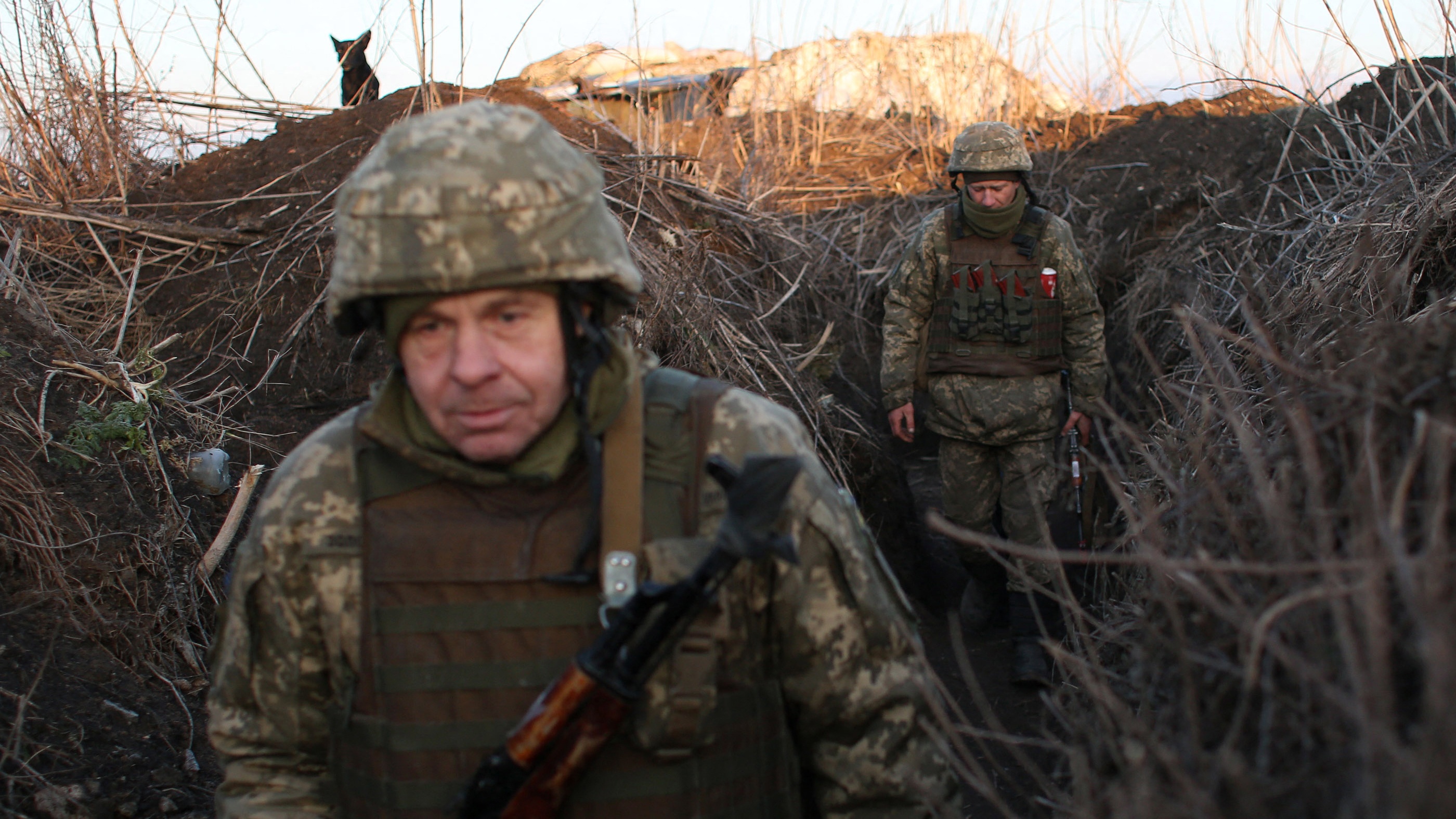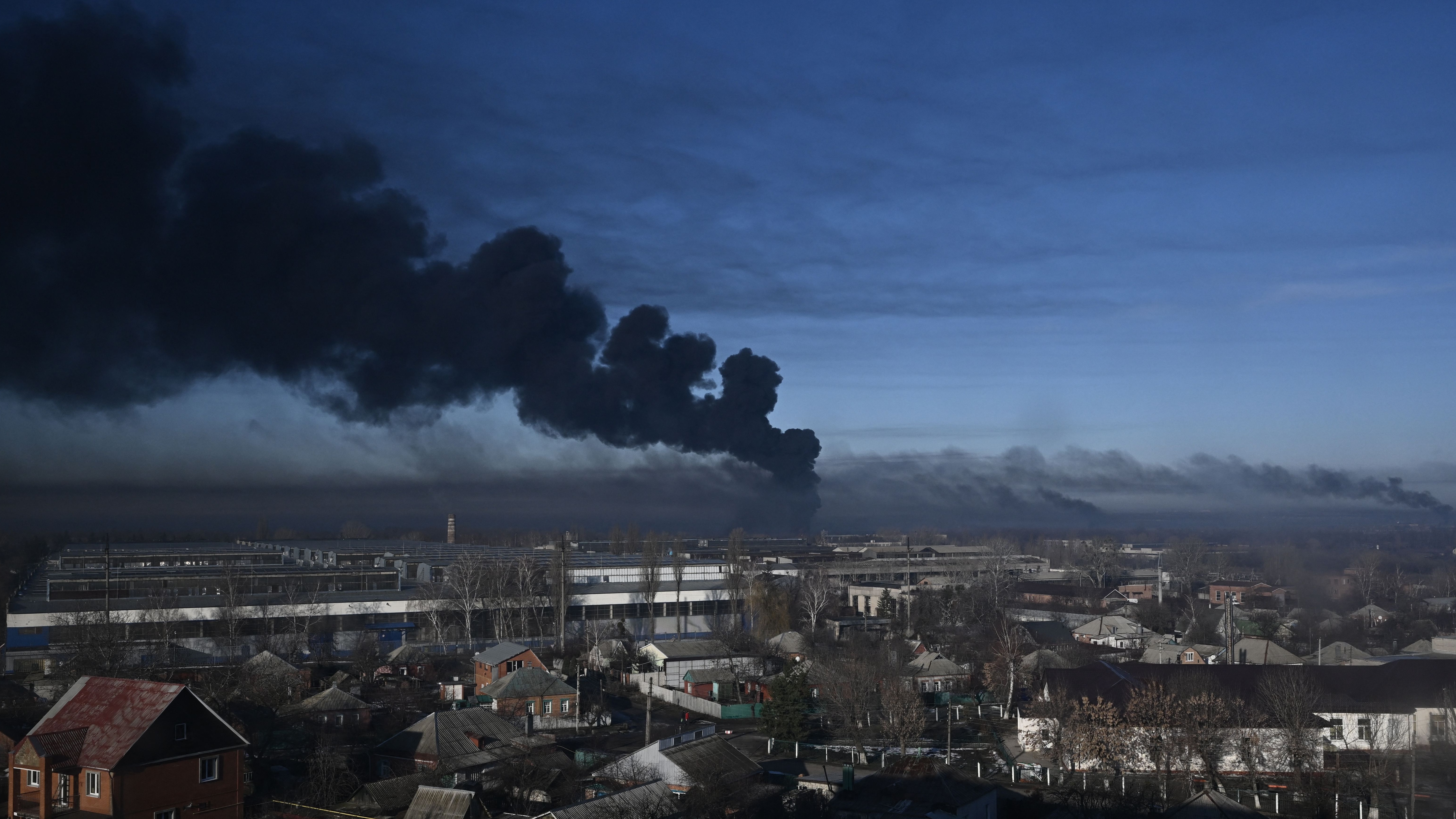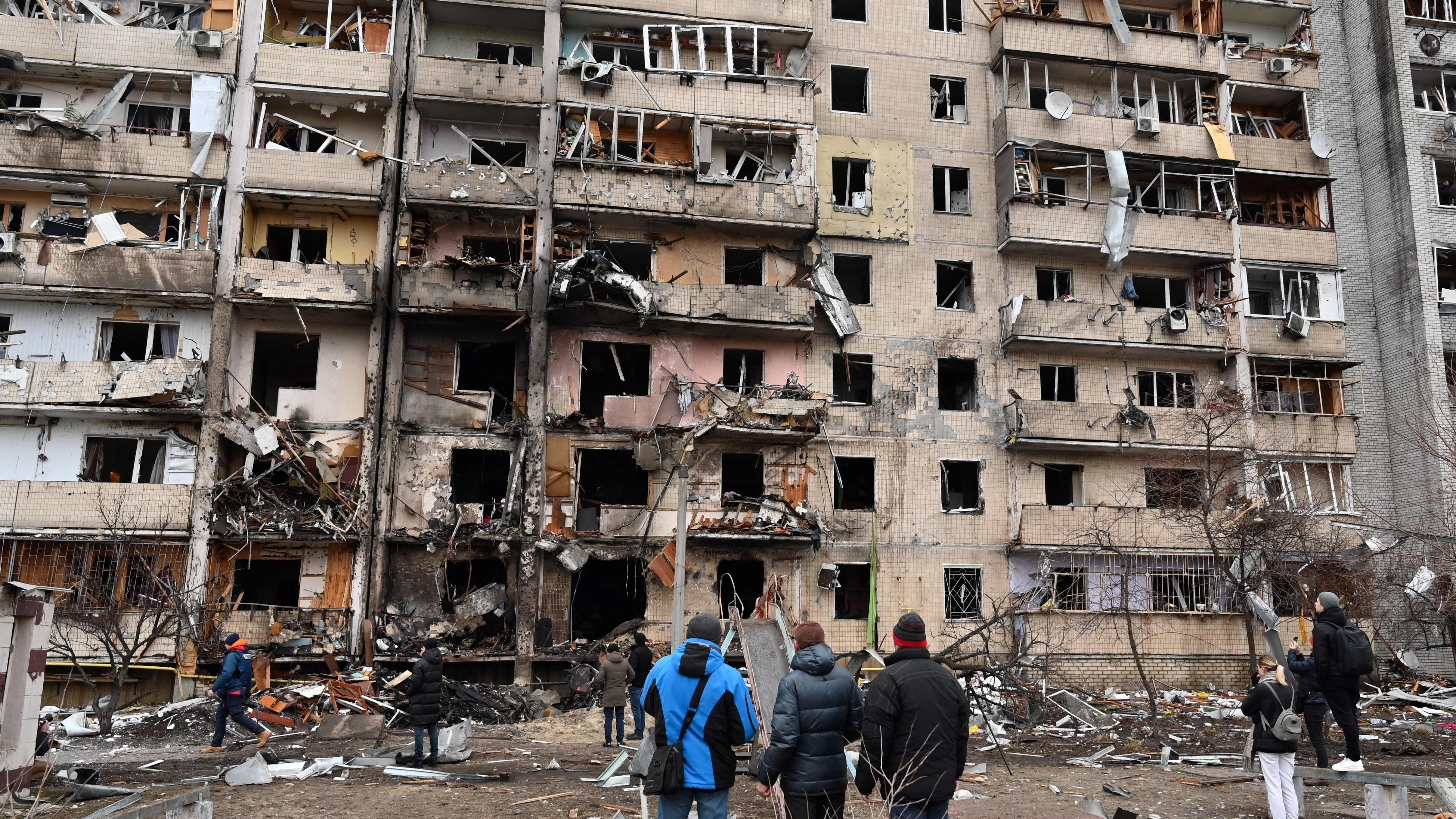How Vladimir Putin launched a war against Ukraine on three fronts
Russian ‘sabotage groups’ have reportedly entered Kyiv to target president

A free daily email with the biggest news stories of the day – and the best features from TheWeek.com
You are now subscribed
Your newsletter sign-up was successful
Ukrainian president Volodymyr Zelenskyy has accused Vladimir Putin of targeting civilians as well as military sites after explosions were heard across Kyiv and Russian troops reportedly came within 20 miles of the capital city.
According to the Kyiv Independent, Russian troops reached the Obolon district of the city, an area five miles from the government’s headquarters. Residents in Obolon were asked to “make Molotov cocktails” and inform the military about Russian movements.
UK Defence Secretary Ben Wallace this morning told Sky News that Russia is yet to take or hold any of its major objectives and that it lost more than 450 military personnel on the first day of Putin’s attempt “to invade the whole of Ukraine”.
The Week
Escape your echo chamber. Get the facts behind the news, plus analysis from multiple perspectives.

Sign up for The Week's Free Newsletters
From our morning news briefing to a weekly Good News Newsletter, get the best of The Week delivered directly to your inbox.
From our morning news briefing to a weekly Good News Newsletter, get the best of The Week delivered directly to your inbox.
Intelligence suggests that the Russian president’s invasion is “behind its hoped-for timetable”, Wallace said, continuing that “contrary to great Russian claims and indeed President Putin’s vision that somehow the Ukrainians would be liberated and would be flocking to his cause, he’s got that completely wrong”.
Three fronts
UK military sources told The Times’ defence editor Larisa Brown that when it finally came, Putin’s assault on Ukraine was “straight out of the Russian playbook”.
The Kremlin swept across the border in three places opting for “for overwhelming force and a multi-axis invasion from land, sea, and air”, Brown said. Forces launched assaults “from the north, south and east simultaneously attacking ten Ukrainian regions”.
Having mobilised the biggest deployment of troops on European soil since the end of the Second World War, “the scope of the Russian attack was huge”, Brown added.
A free daily email with the biggest news stories of the day – and the best features from TheWeek.com
The Russian ground force is “very mobile”, Justin Crump, a military veteran and chief executive of Sibylline, an intelligence and geopolitical risk firm, told the paper. As a result it was able to move across the country with rapid and deadly speed.
“They are willing to be much more destructive than the West would be and are much less concerned about civilian casualties,” he added.

Open source intelligence mapping shows Russian troops were deployed from across the border in Belarus to the north of Kyiv, from Russia to the east of Kharkiv, through the separatist-controlled areas in Ukraine’s east and from annexed Crimea in the south.
“Shelling and missile strikes have been reported all over the country,” The Independent reported, with experts suggesting the widespread “airstrikes are being used to clear the way for ground forces to move in”.
According to The Times, Ukraine’s forces are “outgunned and outnumbered across land, sea and air” meaning that they “could be destroyed within 72 hours”.
This was echoed by Dr Jack Watling, a research fellow at the Royal United Services Institute, who told the paper that the Ukrainian army will soon cease to be a “functioning military” having been reduced to “pockets of resistance”.
Final surge
The ramping up of aerial attacks on the capital will only heighten fears that Putin is planning a final strike on the country’s centre of government.
Ukrainian officials this morning claimed the army “had shot down a Russian military aircraft that was flying over the capital”, The Guardian said. The interior ministry later said “a residential tower block had been set on fire by the falling debris”.

Pictures and television reports have also emerged of “Kyiv residents crowding into underground metro stations where they are taking shelter from further Russian attacks”, the paper added, while thousands are still attempting to flee the capital.
US Secretary of State Antony Blinken last night warned that “all evidence suggests that Russia intends to encircle and threaten” Kyiv, adding that he is “convinced” it is Putin’s plan to overthrow the country’s democratically elected government.
In a televised address, President Zelenskyy said he does not intend to leave the city, despite being marked as a target by Moscow.
Wearing a military T-shirt, Zelenskyy said during a video statement issued shortly before dawn that Russian “sabotage groups” have entered Kyiv, continuing: “According to our information, the enemy marked me as target No 1, my family as target No 2. They want to destroy Ukraine politically by destroying the head of state.
“I am staying in the government quarter together with others,” he added. “We have been left alone to defend our state. Who is ready to fight alongside us? I don’t see anyone.”
-
 The President’s Cake: ‘sweet tragedy’ about a little girl on a baking mission in Iraq
The President’s Cake: ‘sweet tragedy’ about a little girl on a baking mission in IraqThe Week Recommends Charming debut from Hasan Hadi is filled with ‘vivid characters’
-
 Kia EV4: a ‘terrifically comfy’ electric car
Kia EV4: a ‘terrifically comfy’ electric carThe Week Recommends The family-friendly vehicle has ‘plush seats’ and generous space
-
 Bonfire of the Murdochs: an ‘utterly gripping’ book
Bonfire of the Murdochs: an ‘utterly gripping’ bookThe Week Recommends Gabriel Sherman examines Rupert Murdoch’s ‘war of succession’ over his media empire
-
 Putin’s shadow war
Putin’s shadow warFeature The Kremlin is waging a campaign of sabotage and subversion against Ukraine’s allies in the West
-
 Alexei Navalny and Russia’s history of poisonings
Alexei Navalny and Russia’s history of poisoningsThe Explainer ‘Precise’ and ‘deniable’, the Kremlin’s use of poison to silence critics has become a ’geopolitical signature flourish’
-
 What happens now that the US-Russia nuclear treaty is expiring?
What happens now that the US-Russia nuclear treaty is expiring?TODAY’S BIG QUESTION Weapons experts worry that the end of the New START treaty marks the beginning of a 21st-century atomic arms race
-
 Epstein files topple law CEO, roil UK government
Epstein files topple law CEO, roil UK governmentSpeed Read Peter Mandelson, Britain’s former ambassador to the US, is caught up in the scandal
-
 Iran and US prepare to meet after skirmishes
Iran and US prepare to meet after skirmishesSpeed Read The incident comes amid heightened tensions in the Middle East
-
 Israel retrieves final hostage’s body from Gaza
Israel retrieves final hostage’s body from GazaSpeed Read The 24-year-old police officer was killed during the initial Hamas attack
-
 China’s Xi targets top general in growing purge
China’s Xi targets top general in growing purgeSpeed Read Zhang Youxia is being investigated over ‘grave violations’ of the law
-
 Ukraine, US and Russia: do rare trilateral talks mean peace is possible?
Ukraine, US and Russia: do rare trilateral talks mean peace is possible?Rush to meet signals potential agreement but scepticism of Russian motives remain